#Tricycle: The Buddhist Review
Text

hungry ghosts
* * * *
"Buddhism offers a skillful means for relieving feelings of outrage, by shifting the perspective from how outraged one feels to the question of who feels outraged."
— Mark Epstein #DailyDharma
Tricycle: The Buddhist Review :: @tricyclemag
10 notes
·
View notes
Text
We are always seeking something from the outside and forgetting that our fundamental well-being and strength depend on how we relate to our own minds.
— Dzigar Kongtrul Rinpoche, “Old Relationships, New Possibilities” (Winter 2008 issue of Tricycle: The Buddhist Review. The Tricycle Foundation) (via Alive on All Channels)
15 notes
·
View notes
Text
“Meditation practice is a way of loosening our solidity. Without practice, even the most inspired view can become rigid ideology. The practice of meditation brings out the futility and limitations of holding any rigid view.”
- Judy Lief, Meditation Alone is Not Enough for Tricycle: The Buddhist Review
12 notes
·
View notes
Text
916. Helen Tworkov
Helen Tworkov is the author of the debut memoir Lotus Girl, available from St. Martin's Essentials.
Tworkov is founding editor of Tricycle: The Buddhist Review, the first and only independent Buddhist magazine, and author of Zen in America: Profiles of Five Teachers (North Point Press; 1989). She first encountered Buddhism in Asia in the 1960s and has studied in both the Zen and Tibetan traditions. Since 2006 she has been a student of the Kagyu and Nyingma Tibetan master Yongey Mingyur Rinpoche, and has assisted him in the writing of In Love With The World: A Monk's Journey Through the Bardos of Living and Dying (Spiegel and Grau; 2019) and Turning Confusion into Clarity: A Guide to the Foundation Practices of Tibetan Buddhism (Shambhala Publications; 2014).
***
Otherppl with Brad Listi is a weekly literary podcast featuring in-depth interviews with today's leading writers.
Available where podcasts are available: Apple Podcasts, Spotify, YouTube, etc.
Subscribe to Brad Listi’s email newsletter.
Support the show on Patreon
Merch
Twitter
Instagram
TikTok
Bluesky
Email the show: letters [at] otherppl [dot] com
The podcast is a proud affiliate partner of Bookshop, working to support local, independent bookstores.
www.otherppl.com
0 notes
Text
Blackprints for Freedom
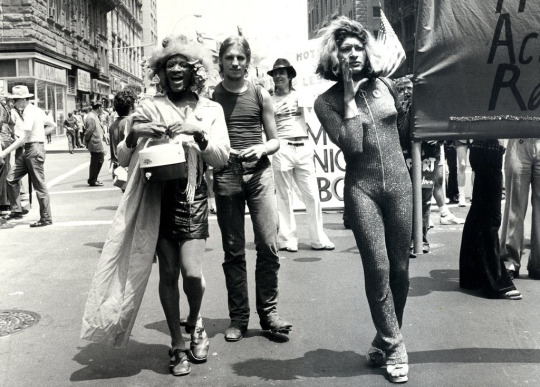
This section specifically focuses on the organizations that helped to fight for visibility and power in the queer/trans and women/people of color communities. Whether that be fighting for rights or holding safe spaces for people to be themselves, these organizations were incredibly important when it came to activists and movements. It is important to recognize that indigenous people and women of color were the main people who led movements that were life-changing in the 70s and 80s. A lot of the LGB spaces in that time were transphobic, anti-substance users, and anti-sex workers. This led to wide gaps in care for trans folks. However, while movements are great and they help to change the world for the better, this section explains that they are not supposed to be safe. Barbara Smith said “You can’t be safe under systems of massive oppression”. However, you create safe spaces within those movements to be able to come back, find peace, and process what you are going through. Connecting to this idea of finding peace and recharging a little bit, there is a website that has a couple of mindfulness activities specifically for activists experiencing burnout that I thought would be helpful to put in:
Mindfulness for Activists - Tricycle: The Buddhist Review
Picture link:
Opinion | Milestones in the American Transgender Movement - The New York Times (nytimes.com)
0 notes
Text
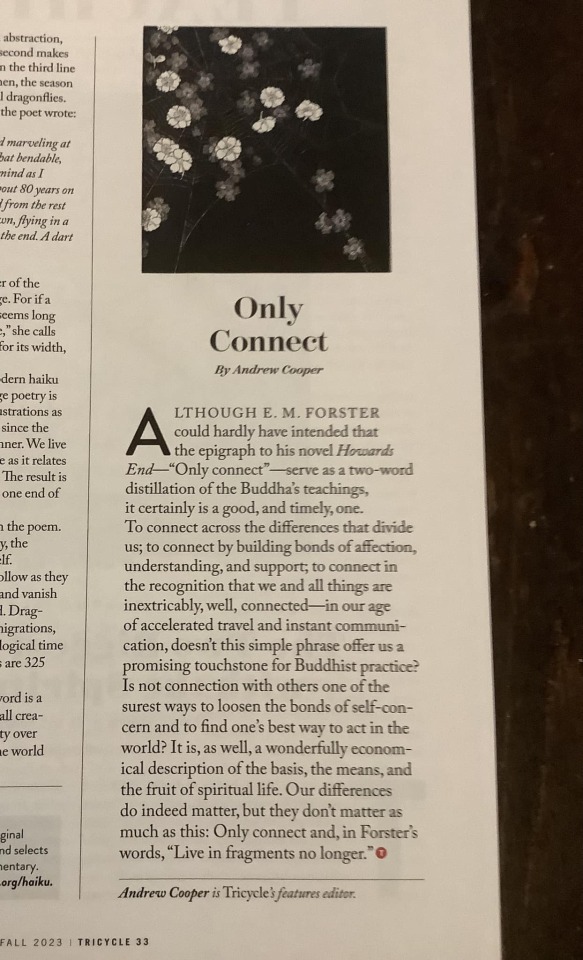
From Tricycle: The Buddhist Review, Fall 2023
1 note
·
View note
Quote
One morning I sat down to meditate, and I heard a bird call outside the window. From my gut, I felt a question arise that I had never heard before: Who hears this sound? Immediately the whole world turned inside out and upside down, and I was the bird and the sound and the hearing of the sound, the cushion, the room, everything. It’s not that I as a separate self merged with everything. It was just a pure seeing that everything is one, and that I am that. Unlike other kenshos, this one unfolded with no emotion whatsoever.
Then, in the middle of the experience, something—or rather, nothing—woke up out of the oneness. I knew that I was everything in manifestation, however subtle or dense, and yet I was also total emptiness, empty of even the experience of emptiness, and suddenly everything was seen to be a dream. There was a deeply felt kinesthetic sense of being everything and at the same time nothing. I knew with my whole being that who I really was wasn’t even the oneness, it was the emptiness prior to the oneness, forever awake to itself. This knowing has never changed or faded in any way.
The Taboo of Enlightenment - Tricycle: The Buddhist Review
0 notes
Quote
In trading the pleasures of an ordinary life for a meditative life, you’re trading candy for gold.
Thanissaro Bhikkhu
Tricycle: The Buddhist Review
41 notes
·
View notes
Photo
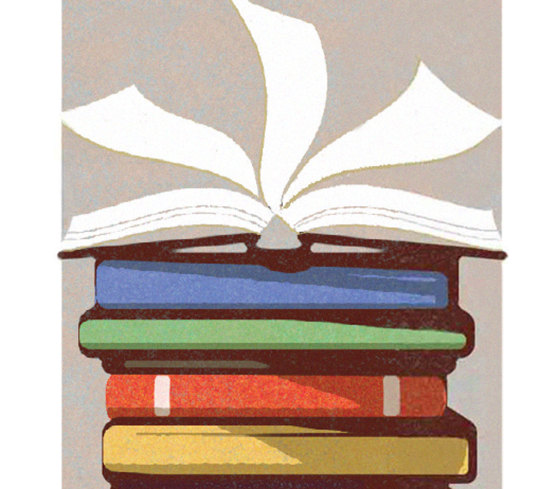
Tuere Sala: Turning Word – Tricycle: The Buddhist Review What Buddhist reserve has experienced a important impact on your practice? 2003 was the start of a difficult meditation period for me.
0 notes
Photo
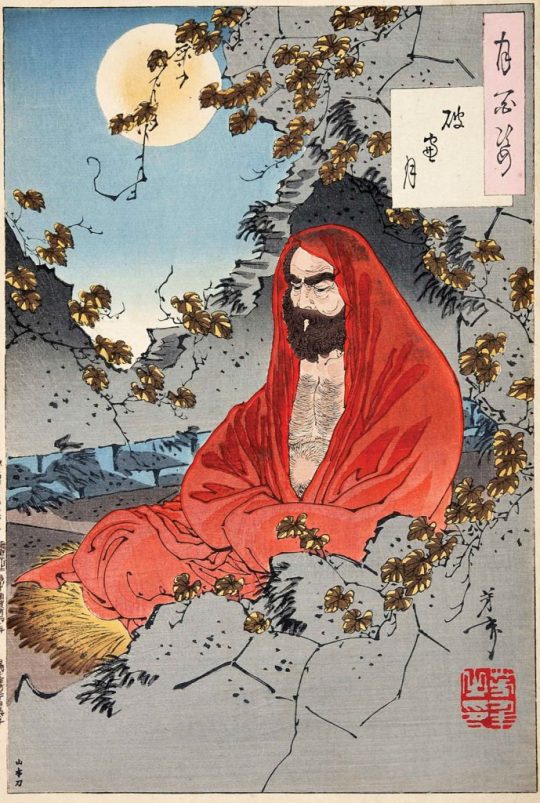
Bodhidharma, the first patriarch of Chan (Zen) Buddhism | Artwork by Yoshitoshi / courtesy Wikipedia
[Tricycle: The Buddhist Review]
* * * *
"Loneliness is the feeling that one is not complete alone. What if it turns out nothing is missing at all? What if nothing changes when another person is near?"
— Sallie Jiko Tisdale
#Tricycle#The Buddhist Review#Sallie Jiko Tisdale#quotes#buddhist#Bodhidharma#zen#practice#lonliness
29 notes
·
View notes
Photo
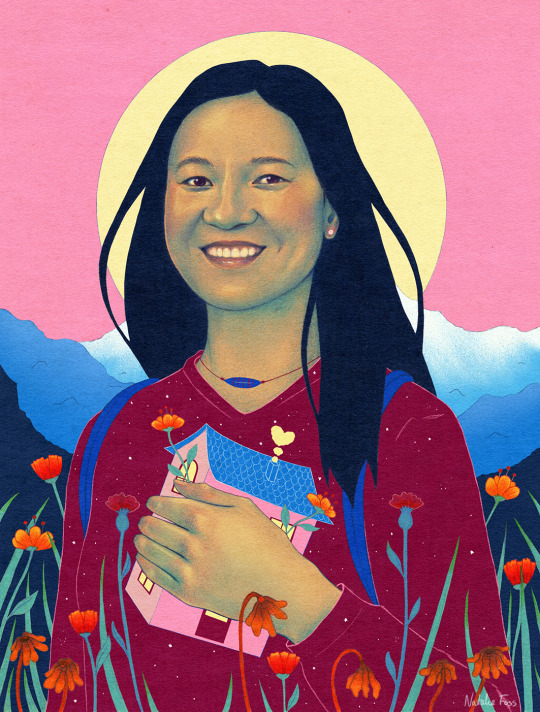
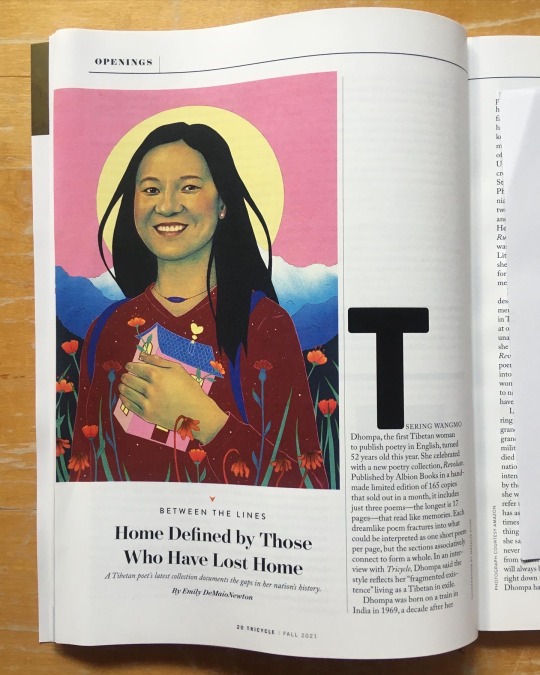
“Home defined by those who have lost home”.
Portrait of poet Tsering Wangmo Dhompa for Tricycle: The Buddhist Review
#tsering wangmo dhompa#tibet#illustration#editorial#portrait#tricycle magazine#buddhist#drawing#home#natalie foss
27 notes
·
View notes
Text
“With steady awareness of the way things are, the perseverance to stay with that awareness, and the willingness to learn from it, we maximize our sense of well-being.”
- Steve Armstrong, Got Attitude? for Tricycle: The Buddhist Review
5 notes
·
View notes
Photo

Fresh Perception When we trust with our open heart, whatever occurs, at the very moment that it occurs, can be perceived as fresh and unstained by the clouds of hope and fear. Chögyam Trungpa Rinpoche used the phrase "first thought, best thought" to refer to the first moment of fresh perception, before the colorful and coloring clouds of judgement and personal interpretation take over. "First thought" is "best thought" because it has not yet got covered over by all our opinions and interpretations, our hopes and fears, our likes and dislikes. It is direct perception of the world as it is. Sometimes we discover "first thought, best thought" by relaxing into the present in a very simple way. --Jeremy Hayward, in Tricycle: The Buddhist Review, Vol. IV, #3 (at New Haven Zen Center) https://www.instagram.com/p/CXoJ6dnLdOW/?utm_medium=tumblr
2 notes
·
View notes
Photo
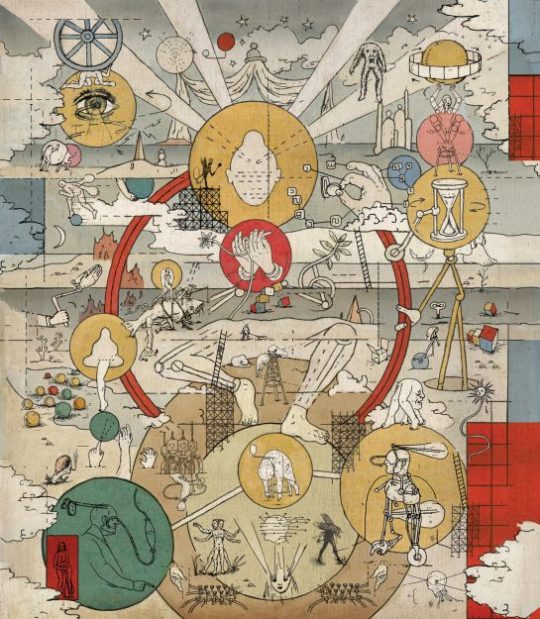
(via The History of Buddhism and Activism - Tricycle: The Buddhist Review) Illustration by jrosenstudio
14 notes
·
View notes
Photo
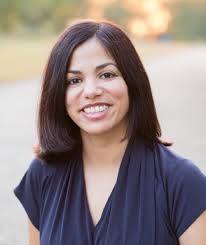
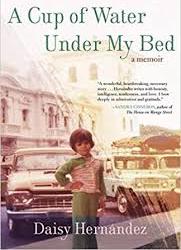
Today’s QAOC is Daisy Hernández!
From Her Website:
Daisy Hernández is the author of the award-winning memoir A Cup of Water Under My Bed and coeditor of Colonize This! Young Women of Color on Today's Feminism. The former editor of ColorLines magazine, she has reported for The Atlantic, The New York Times, and Slate, and she has written for NPR's All Things Considered and CodeSwitch. Her essays and fiction have appeared in Aster(ix), Bellingham Review, Brevity, Dogwood, Fourth Genre, Gulf Coast, Juked, and Rumpusamong other journals. A contributing editor for the Buddhist magazine Tricycle, Daisy is an Assistant Professor in the Creative Writing Program at Miami University in Ohio.
A Good Read: A Cup of Water Under My Bed
In this lyrical, coming-of-age memoir, Daisy Hernández chronicles what the women in her Cuban-Colombian family taught her about love, money, and race. Her mother warns her about envidia and men who seduce you with pastries, while one tía bemoans that her niece is turning out to be “una india” instead of an American. Another auntie instructs that when two people are close, they are bound to become like uña y mugre, fingernails and dirt, and that no, Daisy’s father is not godless. He’s simply praying to a candy dish that can be traced back to Africa.
These lessons—rooted in women’s experiences of migration, colonization, y cariño—define in evocative detail what it means to grow up female in an immigrant home. In one story, Daisy sets out to defy the dictates of race and class that preoccupy her mother and tías, but dating women and transmen, and coming to identify as bisexual, leads her to unexpected questions. In another piece, NAFTA shuts local factories in her hometown on the outskirts of New York City, and she begins translating unemployment forms for her parents, moving between English and Spanish, as well as private and collective fears. In prose that is both memoir and commentary, Daisy reflects on reporting for the New York Times as the paper is rocked by the biggest plagiarism scandal in its history and plunged into debates about the role of race in the newsroom.
A heartfelt exploration of family, identity, and language, A Cup of Water Under My Bed is ultimately a daughter’s story of finding herself and her community, and of creating a new, queer life.
2 notes
·
View notes
Text
Why Meditate?
‘Why meditate? Sometimes I wonder why we need to ask this question. Nobody who admires a talented artist, or pianist and who would like to become one would say, “Why should I train? Why don’t I just go on stage and play Mozart?” However, when it comes to the basic human qualities that we might admire and hope to acquire - altruism, inner strength, inner freedom to deal with whatever comes our way, emotional balance, not being swayed by hatred and craving and jealousy - we think that they come up just because we want them to, without any training. Our we think that they are fixed, permanent, and that we can’t change them. It is absurd to think that we do not need training to nourish these kind of positive qualities.
We have the potential to be more kind, to practice mindfulness, and to experience well-being, but we only use a small fraction of the potential we have. So that’s what meditation is about: to cultivate the qualities that we have the potential for but that remain dormant, latent, unused, and to develop them to the best of our potential.’
- Matthieu Ricard, Why Meditate, from an interview in the Fall 2010 issue of Tricycle: The Buddhist Review.
252 notes
·
View notes